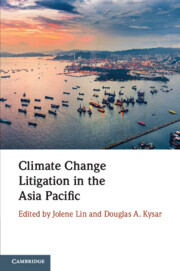Book contents
- Climate Change Litigation in the Asia Pacific
- Climate Change Litigation in the Asia Pacific
- Copyright page
- Contents
- Figures
- Tables
- Contributors
- Foreword
- Abbreviations
- Introduction
- Part I Theoretical Underpinnings and Implications of Climate Change Litigation
- Part II International Law and International Adjudication
- Part III Domestic Law and Domestic Adjudication
- 7 ‘Next Generation’ Climate Change Litigation in Australia
- 8 Climate Change Litigation: A Possibility for Malaysia?
- 9 Climate Change Litigation in Indonesia
- 10 From Shehla Zia to Asghar Leghari: Pronouncing Unwritten Rights Is More Complex than a Celebratory Tale
- 11 Climate Change Adaptation Litigation: A View from Southeast Asia
- Part IV China, Courts and Climate Change
- Index
10 - From Shehla Zia to Asghar Leghari: Pronouncing Unwritten Rights Is More Complex than a Celebratory Tale
from Part III - Domestic Law and Domestic Adjudication
Published online by Cambridge University Press: 06 November 2020
- Climate Change Litigation in the Asia Pacific
- Climate Change Litigation in the Asia Pacific
- Copyright page
- Contents
- Figures
- Tables
- Contributors
- Foreword
- Abbreviations
- Introduction
- Part I Theoretical Underpinnings and Implications of Climate Change Litigation
- Part II International Law and International Adjudication
- Part III Domestic Law and Domestic Adjudication
- 7 ‘Next Generation’ Climate Change Litigation in Australia
- 8 Climate Change Litigation: A Possibility for Malaysia?
- 9 Climate Change Litigation in Indonesia
- 10 From Shehla Zia to Asghar Leghari: Pronouncing Unwritten Rights Is More Complex than a Celebratory Tale
- 11 Climate Change Adaptation Litigation: A View from Southeast Asia
- Part IV China, Courts and Climate Change
- Index
Summary
This chapter critically examines the landmark case of Asghar Leghari v. Federation of Pakistan and Others in the climate litigation docket from the perspective of Pakistani constitutional law. It argues that the Leghari case is the result of an evolutionary process, remarkable in its own right, that has seen the Pakistani courts’ grow increasingly receptive to the adjudication of environmental issues in their constitutional jurisdiction. Through the analysis of environmental law jurisprudence, this chapter shoes how, progressively, various environmental law causes were taken up by these superior courtsHowever, while the pronouncements of the superior courts might be good rhetoric in many cases, it is hard to celebrate these cases as bringing about substantive change on the ground due to reasons such as the use of court-appointed commissions for fact-finding and expertise in constitutional cases relating to environment related claims. Moreover, there is a real danger that judicial activity has stultifying effects on the role of the executive in developing, implementing and enforcing environmental laws. In this light, the story of environmental litigation in Pakistan is much more complex than a celebratory tale.
Keywords
- Type
- Chapter
- Information
- Climate Change Litigation in the Asia Pacific , pp. 261 - 293Publisher: Cambridge University PressPrint publication year: 2020
- 1
- Cited by

